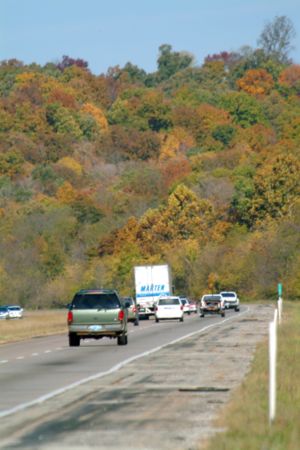Shoulder Surface: Difference between revisions
No edit summary |
m remove "Key Points" box from the article |
||
| Line 1: | Line 1: | ||
[[image:Shoulder Surface Photo.jpg|right|300 px]] | [[image:Shoulder Surface Photo.jpg|right|300 px]] | ||
Paved shoulders and aggregate stabilized shoulders provide a secure surface to accomodate vehicles for emergencies and other uses. Paved shoulders are an integral part of the pavement structure and are considered as part of the pavement design configuration. See [[231.4 Shoulder Width|Shoulder Width]] for additional information | Paved shoulders and aggregate stabilized shoulders provide a secure surface to accomodate vehicles for emergencies and other uses. Paved shoulders are an integral part of the pavement structure and are considered as part of the pavement design configuration. See [[231.4 Shoulder Width|Shoulder Width]] for additional information | ||
Revision as of 10:20, 19 November 2008

Paved shoulders and aggregate stabilized shoulders provide a secure surface to accomodate vehicles for emergencies and other uses. Paved shoulders are an integral part of the pavement structure and are considered as part of the pavement design configuration. See Shoulder Width for additional information
On major roads the entire shoulder width should be paved. On minor roads the shoulder should be aggregate stabilized except where maintenance or safety concerns (e.g., edge drop off, high runoff road occurence) justify a paved shoulder. Shoulders on urban roadways with access control (major or minor) are to be paved. In no case will a paved or aggregate surface be used directly behind a mountable curb along the outer edge of a roadway. A curb and gutter will only be used with an anticipated posted speed less than 50 mph.
Where a paved shoulder is provided for either concrete or asphalt pavements, the full thickness of the travel way pavement is extended laterally to a longitudinal joint 2 ft. outside the travel way. The remainder of the shoulder width is paved with 5 ¾ in. of concrete or asphalt, at the contractor's option, as a Type A2 Shoulder. Where an additional lane is considered imminent, a full depth Type A paved shoulder is provided as an integral part of the pavement structure, with the width desired for future lane use. In this case the joint is placed at the edge of the travel way. Ramp shoulders should be consistent with the mainline. For ramps with integral curbs, the shoulder material and thickness will be specified in the pavement thickness determination.
For maintenance, structural or safety concerns on a minor road, the pavement structure width may be extended two additional feet. If paving the remaining width of shoulder is justified, the shoulder should consist of the Type A2 shoulder design.